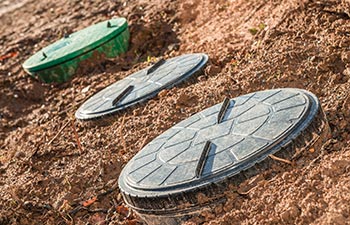
The average homeowner is not a septic expert. If your home relies on a septic system, it’s understandable to have questions and concerns. As your licensed and experienced septic tank technicians, Metro Septic welcomes the opportunity to educate you on what your specific septic system needs to run smoothly for years to come. Here are some FAQ’s to get you started.
How Often Should I Get My Septic Tank Pumped?
There is simply no way to dismiss the fact that your septic tank needs to be pumped periodically. It is necessary for the health, longevity and function of your septic system. The specific frequency that your tank needs to be pumped is directly dependent on the size of your septic tank, the number of occupants in your household and how much you use your system.
The State recommends that you schedule a septic tank pumping every 2-3 years. Your septic system may require more frequent maintenance if you have a large family (especially kids) or you have a garbage disposal that gets used often.
If maintained properly, your septic systems can last many years and be a cost-effective method for your wastewater demands. If you are unsure of your last septic tank pumping, give us a call. Do not wait until costly or disruptive septic problems arise.
Why Do Septic Systems Fail?
Septic systems often fail due to overuse or from introducing toxic materials to your septic system. In addition, if your treated wastewater comes into contact with your groundwater, your system will also fail and result in contamination problems. A trained technician can accurately diagnose your specific problem. However, there are some signs to be aware of in your home that might require attention. Contact us if you experience the following signs of a septic system failure:
- Muddy soil or pooling water near your septic system
- Gurgling or bubbling sounds when flushing your toilet
- Slow draining showers, bathtubs, toilets or sinks
- Bright green strips of grass over the drain field
How Can I Avoid Overloading My Septic System?
Overusing your septic system can result in costly problems. Here are some general guidelines to follow to prevent septic failure due to overload:
- Avoid household toxics such as oil based paints, solvents, toxic cleaners, pesticides and harsh household cleaners.
- Never drain a hot tub or swimming pool in your septic system.
- Do not use water purification systems or water softeners excessively.
- Use your garbage disposal sparingly.
What is the Difference Between a Septic Tank Pumping and Septic Tank Cleaning?
This term is often used interchangeably. When you hire our professionals at Metro Septic for maintenance service, you can trust that we will pump both the water and solids from your septic tank, removing as much solid sludge as possible. In short, your septic system will get cleaned and pumped at the same time because that is what it needs to function smoothly.
Have further questions about your septic tank care? Call Metro Septic today!

